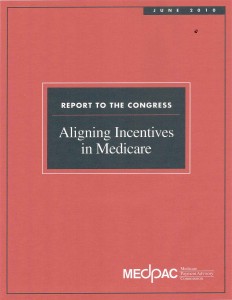 It isn't every day that the Foundation's concerns are echoed by an impartial and authoritative body like MedPAC, the Medicare Payment Advisory Committee, commissioned by Congress to advise on the Medicare program. Although geriatric care was only a small part of a long chapter on graduate medical education payments in MedPAC’s very lengthy June 2010 report, I still think the section on page 111 (quoted below) is very important. It suggests that Medicare may want to make disbursement of Graduate Medical Education (GME) funds contingent upon residency training meeting some requirements in geriatrics. It acknowledges that "basic knowledge in geriatric care" is missing in some cases and that if it were to be attained, it would benefit "elderly Medicare beneficiaries."
It isn't every day that the Foundation's concerns are echoed by an impartial and authoritative body like MedPAC, the Medicare Payment Advisory Committee, commissioned by Congress to advise on the Medicare program. Although geriatric care was only a small part of a long chapter on graduate medical education payments in MedPAC’s very lengthy June 2010 report, I still think the section on page 111 (quoted below) is very important. It suggests that Medicare may want to make disbursement of Graduate Medical Education (GME) funds contingent upon residency training meeting some requirements in geriatrics. It acknowledges that "basic knowledge in geriatric care" is missing in some cases and that if it were to be attained, it would benefit "elderly Medicare beneficiaries."
In the endnote to the paragraph I've quoted below, MedPACs commissioners refer to the effort to require some universal minimum competence through a broad collaboration of the medical professional societies and regulatory bodies, but spearheaded by the Geriatrics for Specialists Initiative and coordinated by the American Geriatrics Society. The private foundations cited are the John A. Hartford Foundation, the Donald W. Reynolds Foundation, and The Atlantic Philanthropies (under their prior Aging/Human Capital Development approach). These efforts move very, very deliberately, as any consensus process on such important matters must, but I am all the more optimistic given this supportive suggestion from MedPAC. Lastly, if one looks at the citations used for this recommendation, once again we can see the value of the leadership provided by grantees such as Rosanne Leipzig, Steve Counsel, and Chad Boult and of the Retooling for an Aging America report produced by the Institute of Medicine.
From Aligning Incentives in Medicare. Report to the Congress. MedPAC, June 2010. Chapter 4, page 111:
An educational goal that is particularly pertinent to Medicare is the growing need for basic geriatric competency among almost all our physicians, as called for by many experts, clinicians, and researchers (Boult et al. 2010, Institute of Medicine 2008, Leipzig et al. 2009). While many specialties require some form of geriatric instruction for ACGME accreditation, and several organizations have collaborated to develop a set of geriatric competencies for all medical students and residents, Medicare’s GME financing does not place any requirements on geriatric skills and experience.6Encouraging basic knowledge in geriatric care among graduating residents would have important benefits for elderly Medicare beneficiaries.
6With support from private foundations, the Association of American Medical Colleges, the American Medical Association, the Council of Medical Specialty Societies, and the American Geriatrics Society have launched a competency based education and training initiative to ensure that all medical students and residents achieve basic competence in the care of older adults. The competencies, initially for graduating medical students, include measurable tasks associated with evidence-based geriatric care and patient safety. They fall into four main categories, those that: (1) are critical to patient safety and quality of care (medication management, self-care capacity, falls, balance and gait disorders, and hospital care for elders); (2) address the prevalence and under-recognition of cognitive impairment; (3) address the complexity of diagnosis (atypical presentation of disease); and (4) address prioritizing care based on patient preference and function.
References cited
Boult, C., S. R. Counsell, R. M. Leipzig, R.A. Berenson 2010. The urgency of preparing primary care physicians to care for older people with chronic illnesses. Health Affairs 29(5): 811-818.
Institute of Medicine. Retooling for an Aging America. April 11, 2008.
Leipzig, R. M., L. Granville, D. Simpson, et al. 2009. Keeping granny safe on July 1: A consensus on minimum geriatrics competencies for graduating medical students. Academic Medicine 84, no. 5 (May): 604–610.
